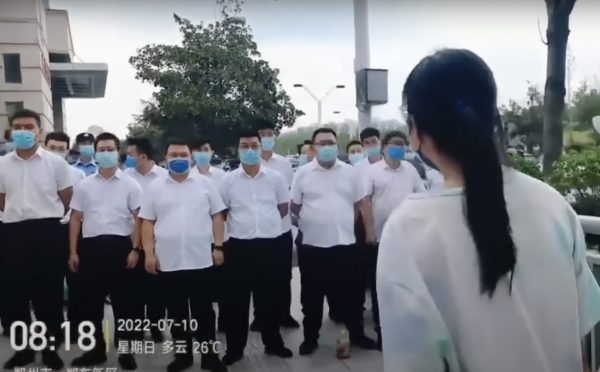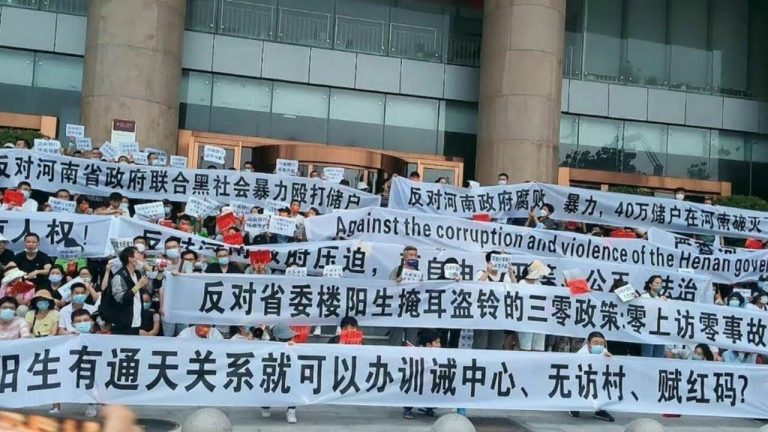News analysis
Angry protesters took to the streets in China’s Henan Province on July 10 after their bank accounts were frozen overnight without explanation — and ended up in violent clashes with the police as they fought for access to their life’s savings.
On July 10, following many days of demonstrations across the central province of around 95 million people, droves of people gathered outside the People’s Bank of China (PBoC) branch in Zhengzhou, Henan’s capital, to demand their money. They were met with beatings and arrests at the hands of uniformed and plainclothes public security officers.
Many protesters who set out for Zhengzhou to demand action from banking regulators found that their health status on the app had turned red — preventing them from traveling and risking arrest for breaking COVID protocols. Some even reported being questioned by police officers after checking into their hotels about why they had come to the city.

The protesters are among thousands of customers who opened accounts at the banks in Henan and neighboring Anhui Province that offered relatively high interest rates. However, the bank depositors later found out that they could not make withdrawals after state media reports revealed that the head of the banks’ parent company was being prosecuted for tax evasion, fraud and other financial crimes.
Success
You are now signed up for our newsletter
Success
Check your email to complete sign up
Mainland Chinese media have estimated the number of affected depositors to number around 400,000. Going deeper, the trouble points to the triggering of systemic financial risks as China’s real estate crisis spirals out of control.
READ MORE
- Scorching Heat Waves Sweep Through 84 Cities in China, Killing Multiple People and Triggering Govt. Power Cuts
- Hongkongers Fear Tightening Regime Control as Officials Promote Mainland-style ‘Health Codes’
- Chinese Police Investigated Over Attack on Female Diners in Tangshan
Bank of Nanjing stocks collapse
Rural banks in Henan are not the only Chinese financial institutions seeing financial trouble in recent weeks. Experts have described the Zhengzhou banking crisis as another example of China’s struggling economy amid unrelenting “zero-COVID” policies, prolonged lockdowns and movement curbs that have resulted in massive supply chain disruptions and impacted consumer spending.
On June 30, the market value of Bank of Nanjing’s stocks dropped precipitously, losing more than 7.4 billion yuan (US$1.1 billion) following a sudden leadership change.
The bank, based in the eastern Chinese city of 9 million, had announced on June 29 that its director and president Lin Jingran had been “reappointed” to another position owing to “work necessities.” Lin’s new position, however, has him as the vice chairman of a state-owned enterprise with assets worth just 10 percent of BoN.
Communist authorities quickly laid blame for the tumbling of the Nanjing bank’s stocks on “malicious rumors,” but the real reason, per an industry analyst, for the BoN’s crisis is that it has been helping out the local government with its own economic malaise.
READ MORE:
- China Fights Uphill Battle to Rescue Its Economy While Keeping ‘Zero-COVID’
- In Leaked Recording, Elite Chinese Scholar Laments Crippling Dysfunction of Communist Regime
- China Experiencing Worst Capital Flight in 7 Years, Manufacturers Also Hit Hard

The Nanjing government, the analyst revealed in a WeChat social media discussion group, is riddled with debt, having taken out exorbitant loans for vast but unprofitable projects and leaving the BoN to deal with the loans’ nonperformance — effectively threatening it with collapse.
According to a July 12 article by SinoInsider, the “malicious rumors” about the Bank of Nanjing “are unlikely to have been the trigger for the June 30 sell-off because they were made only after the markets had closed. The markets also remained pessimistic even after the bank released a positive semi-annual performance report.”
A ‘criminal gang’ takes the blame
While cracking down on the protests in Henan, the Chinese Communist Party (CCP) authorities have also moved to explain the troubles at the four rural banks as the work of local fraudsters — and some those who lost their money have been promised they will be reimbursed.
In particular, on July 11, the public security authorities of Henan’s Xuchang city announced an investigation into the “criminal gang” headed by one Lü Yi. While Lü himself has absconded abroad, several arrests have been made, the police said.
Lü, a CCP-linked businessman with dealings in Europe and Africa, has been accused of using the Henan New Fortune Group — which was scrutinized by Chinese regulators this April — to manipulate the embattled rural banks, set up fraudulent loans to move funds, and attract new customers with advantageous-looking online financial schemes.
“Lü Yi and his ‘criminal gang’ may indeed be the main reason for rural bank troubles in Henan. However, problems with banks in Henan and Nanjing are likely only surfacing now because the economic situation in China has worsened to a point where risky or fraudulent schemes can no longer be sustained,” SinoInsider, which is a New York-based consultancy, wrote.
However, the problem goes back far before this year — and beyond problems with a few “fraudsters” like Lü Yi.
Risks come to the fore

Starting in 2015, many smaller banks in China, hoping to reap the benefits of the state-backed “internet economy,” made forays into third-party online platforms to market high-yield deposit products to customers around the country.
While in reality these banks were incapable of handling the massive influx of cash, their risk remained hidden as long as the real estate sector remained strong, since developers were eager to take out bank loans and could pay interest.
The PBoC reported last year that 89 banks had gathered total deposits of 550 billion yuan (about US$81.7 billion) via third-party platforms. Close to half of these banks were determined by the PBoC to be “high-risk” financial institutions; according to SinoInsider, this “was likely a key reason behind the CCP authorities’ move to ban commercial banks from selling deposit products on third-party platforms in January 2021.”
In other words, when the overall economy was growing, minor banks and “criminal gangs” could secure the funds needed to fuel their schemes, but due to China’s struggling business and industry, the crippling “zero-COVID” policies, and an increasingly unfavorable global environment, such ploys are becoming untenable as banks turn up empty-handed when depositors come asking for their money back.
READ MORE
- ‘Unified National Market’ Push Exposes Steep Challenge of Reforming China’s Economy
- Xi Tightens Grip Over Chinese Propaganda Ahead of Key Conclaves
“The industry analyst’s June 30 WeChat postings and information from mainland media indicate that debt problems at the Nanjing local government and property developers like China Evergrande have led to a surge in non-performing loans at the Bank of Nanjing, triggering the bank’s implicit risks,” SinoInsider notes.
According to the consultancy, the cases of the four Henan rural banks and the Bank of Nanjing are a worrying sign of much larger troubles yet to fully emerge.
“Other banks could soon report similar problems as the financial contagion from the property sector debt crisis spreads and the Chinese economy moves towards recession,” SinoInsider reported, noting that the situation could bode ill for Chinese leader Xi Jinping as he attempts to secure a norm-breaking third term at the CCP’s upcoming 20th Party Congress.
Alina Wang contributed to this report.













